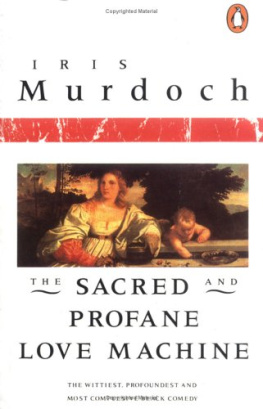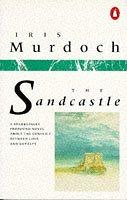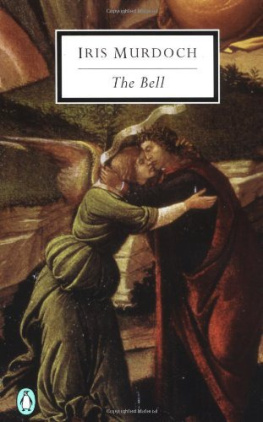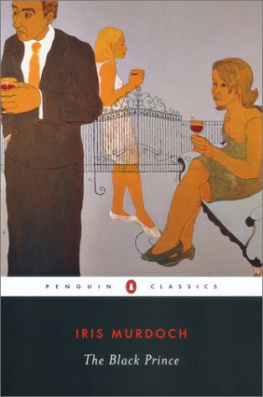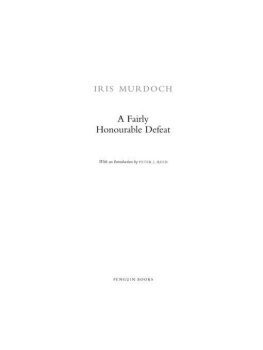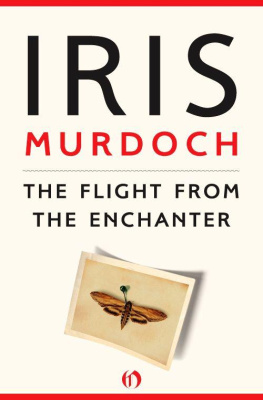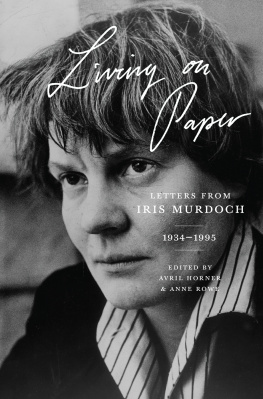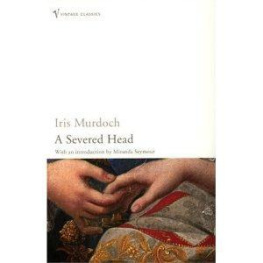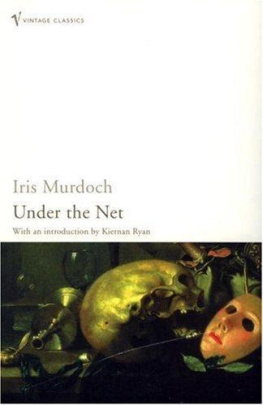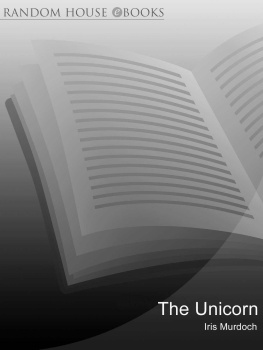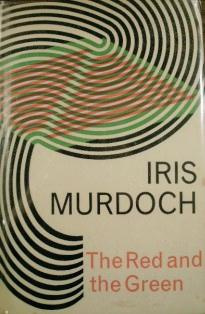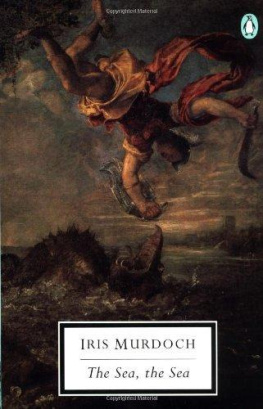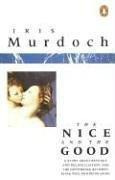Iris Murdoch - The Sacred and Profane Love Machine (Penguin Books)
Here you can read online Iris Murdoch - The Sacred and Profane Love Machine (Penguin Books) full text of the book (entire story) in english for free. Download pdf and epub, get meaning, cover and reviews about this ebook. year: 1984, genre: Art / Prose. Description of the work, (preface) as well as reviews are available. Best literature library LitArk.com created for fans of good reading and offers a wide selection of genres:
Romance novel
Science fiction
Adventure
Detective
Science
History
Home and family
Prose
Art
Politics
Computer
Non-fiction
Religion
Business
Children
Humor
Choose a favorite category and find really read worthwhile books. Enjoy immersion in the world of imagination, feel the emotions of the characters or learn something new for yourself, make an fascinating discovery.
- Book:The Sacred and Profane Love Machine (Penguin Books)
- Author:
- Genre:
- Year:1984
- Rating:3 / 5
- Favourites:Add to favourites
- Your mark:
- 60
- 1
- 2
- 3
- 4
- 5
The Sacred and Profane Love Machine (Penguin Books): summary, description and annotation
We offer to read an annotation, description, summary or preface (depends on what the author of the book "The Sacred and Profane Love Machine (Penguin Books)" wrote himself). If you haven't found the necessary information about the book — write in the comments, we will try to find it.
The Sacred and Profane Love Machine (Penguin Books) — read online for free the complete book (whole text) full work
Below is the text of the book, divided by pages. System saving the place of the last page read, allows you to conveniently read the book "The Sacred and Profane Love Machine (Penguin Books)" online for free, without having to search again every time where you left off. Put a bookmark, and you can go to the page where you finished reading at any time.
Font size:
Interval:
Bookmark:
Penguin Books
The Sacred and Profane Love Machine
Iris Murdoch was born in Dublin of Anglo-Irish parents. She went to Badminton School, Bristol, and read classics at Somerville College, Oxford. During the war she was an Assistant Principal at the Treasury, and then worked with U.N.R.R.A. in London, Belgium and Austria. She held a studentship in philosophy at Newnham College, Cambridge, for a year, and in 1948 returned to teach philosophy in Oxford as a Fellow of St Annes College. In 1956 she married John Bayley, teacher and critic. She was awarded the C.B.E. in 1976 and was made a D.B.E. in the 1987 New Years Honours List.
Her other novels are Under the Net (1954), The Flight from the Enchanter (1955), The Sandcastle (1957), The Bell (1958), A Severed Head (1961), An Unofficial Rose (1962), The Unicorn (1963), The Italian Girl (1964), The Red and the Green (1965), The Time of the Angels (1966), The Nice and the Good (1968), Brunos Dream (1969). A Fairly Honourable Defeat (1970), An Accidental Man (1971), The Black Prince (1973), winner of the James Tait Black Memorial Prize, The Sacred and Profane Love Machine (1974), winner of the Whitbread Prize, A Word Child (1975), Henry and Cato (1976), The Sea, The Sea (1978), for which she won the Booker Prize, Nuns and Soldiers (1980), The Philosophers Pupil (1983) and The Good Apprentice (1985). She has also written The Fire and the Sun: Why Plato Banished the Artist (1977): based on her 1976 Romanes lectures, A Year of Birds (1978), a volume of poetry, and Acastos: Two Platonic Dialogues (1986).
Iris Murdoch
The Sacred and Profane
Love Machine

Penguin Books
PENGUIN BOOKS
Published by the Penguin Group 27 Wrights Lane, London W8 5TZ, England Viking Penguin Inc., 40 West 23rd Street, New York, New York 10010, USA Penguin Books Australia Ltd, Ringwood, Victoria, Australia Penguin Books Canada Ltd, 2801 John Street, Markham, Ontario, Canada L3R 1B4 Penguin Books (NZ) Ltd, 182-190 Wairau Road, Auckland 10, New Zealand
Penguin Books Ltd, Registered Offices: Harmondsworth, Middlesex, England
First published in Great Britain by Chatto & Windus 1974 First published in the United States of America by The Viking Press 1974 Reprinted 1979, 1981, 1983, 1984, 1986, 1988
Copyright Iris Murdoch, 1974 All rights reserved
Printed and bound in Great Britain by Cox & Wyman Ltd, Reading Set in Linotype Times
Except in the United States of America, this book is sold subject to the condition that it shall not, by way of trade or otherwise, be lent, re-sold, hired out, or otherwise circulated without the publishers prior consent in any form of binding or cover other than that in which it is published and without a similar condition including this condition being imposed on the subsequent purchaser
To Norah Smallwood
The boy was there again this evening, and the dogs were not barking.
David stopped in the act of pulling his curtain against the dark twilight and gazed intently down into the garden. The boy was standing under the acacia tree, just on the near-side of the fence that divided the Hood House garden from the orchard. The figure was so still so merged into the blotchy spotty half-darkness of the scene that David would have been at a loss to explain how it was that he was so sure that it was a boy and that the boy was staring at the house. In fact, he had seen the shadowy boy before, two days ago, scarcely more clearly, at about this time. A small figure, a small boy, eight or nine years old perhaps. Why did none of the dogs bark?
David jerked the curtain across and turned on the light. He felt no urge to go down and investigate. The pulling of the curtain had already made the incident seem unreal and unimportant. A sensation which he felt almost all the time now, a sort of mild aching disgust and lassitude, made him unable to concentrate his mind. He sat down heavily upon a chair and turned unfocused eyes upon the blur of bis school books lying about him upon the floor. Then with an involuntary evasive movement he turned back towards the window curtain and blinked hard three times.
He had just been engaged in removing the paper covers from all his books. A large cardboard box contained the mass of glossy sturdy polychrome smashed-up jackets which in a sudden fit of irritable energy he had ripped off, revealing the glowing sides and discreet gilded lettering of the volumes beneath. There was no doubt about it, the books looked more beautiful and more real without their covers. Montague Small had once told him that he had celebrated his fortieth birthday by thus undressing all his library. A wrapped up book is waiting for something, said Montague. David had decided not to let his wait for his seventeenth birthday. He picked up a sleek slim dark blue book and stroked it. Catullus, Oxford Classical Text. Excrucior.
The pain in question was not the agony of love, however, and women were not yet Davids problem, apart from his mother of course. He was visited by highly localized burning erotic anguishes which he relieved (with distaste but without guilt) in the privacy of his room. He dreamed of a Miranda, but none had so far appeared, and the exclusively masculine life of his day school was devoid of love objects. His distress was obscurer, a sort of fear of never being able to be a real person at all. He felt obscenely amorphous, globular, a creature in metamorphosis trailing a half discarded form. Even his terrors were blunted and unvivid, not enlivening. Lassitude and disgust staled all.
David was a fastidious boy. The wet red mouths of the dogs offended him, and the sight of bis mother smiling upon that row of slobbering noisy feeders. He noticed how things dropped from his fathers fork at meal-times, even from his fathers lips: his father who now turned crimson in the face after a second glass of wine. The involuntary spasms of the body, its slimy moist interior, inspired horror. Shameless kissing in the cinema made him turn away. He would have given up eating altogether if that had been possible, would at any rate have eaten only in private, picking up dry small fragments with his fingers. Any slovenly messiness in the kitchen made him squeamish. His mother licking a spoon, then using it to stir the food. Greasy stuff trodden underfoot. The dogs made the garden foul, however much his mother ran about, and sometimes inside the house itself a vile smell would destroy both appetite and peace. They were not even very nice dogs. An early reading of the The Hound of the Baskervilles had made David afraid of dogs. Only of course he told nobody about this.
Last night he had dreamt about a huge blue fish struggling in the breaking waves upon the very edge of the sea. As it opened its dripping mouth towards him he had seen that its tail was half a girl with long flailing legs. He woke in horror to the sound of a howling dog. He had so often told his dreams to his father when he was a small child, it was as if his father still roamed inquisitively in his dream world, a co-spectator rather than a denizen. A blessed silence upon almost every subject had fallen between them in the last year. After the dream, he had lain awake tormented by images, faces that imposed themselves upon his closed eyes. Often it was the face of Christ, hanging just before him as upon a veil, amazingly beautiful, then turning gradually into a sneering mask. Christ was a problem to David. Prayer had been an addiction once, but the perpetual presence of this ubiquitous intrusive Friend amounted now almost to hallucination. Why had such a weird belief been induced in him when he was too young to defend himself against it? And how had his mothers vague gentle faith and the mild Anglicanism of his public school spawned in him the secret superstitions of a mopping mowing slave? Compulsive stupid rituals had replaced those frenzied conversations with God. There was a smelly intimacy about it all, connected with his mother, his mothers knee, sentimental gushings of a ridiculous familiarity offered to a deity devoid of dignity, devoid of austerity, devoid even of mystery, but now just proving horribly hard to get rid of.
Next pageFont size:
Interval:
Bookmark:
Similar books «The Sacred and Profane Love Machine (Penguin Books)»
Look at similar books to The Sacred and Profane Love Machine (Penguin Books). We have selected literature similar in name and meaning in the hope of providing readers with more options to find new, interesting, not yet read works.
Discussion, reviews of the book The Sacred and Profane Love Machine (Penguin Books) and just readers' own opinions. Leave your comments, write what you think about the work, its meaning or the main characters. Specify what exactly you liked and what you didn't like, and why you think so.

